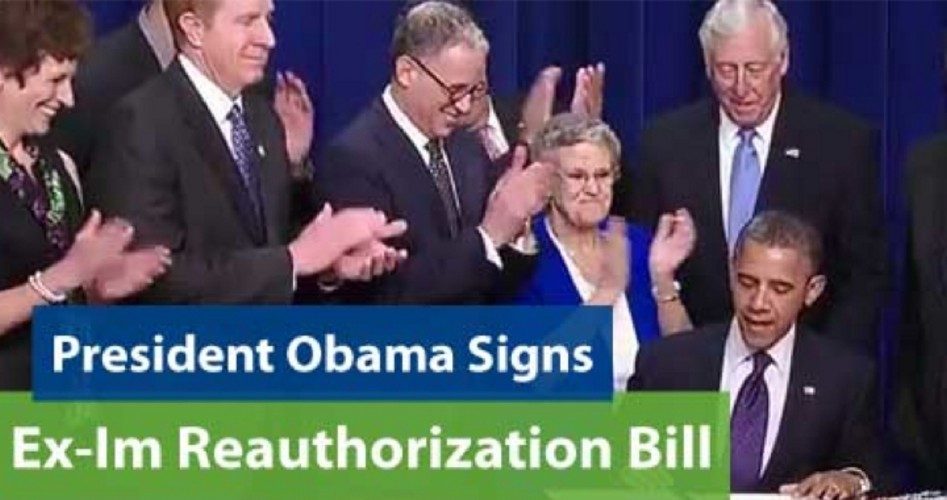
Is the Export-Import Bank “corporate welfare” or “critical support” for American businesses? According to Barack Obama, it’s both.
Back in 2008, then-Sen. Obama denounced the Ex-Im Bank as a government program that should be “cut back” because it had “become little more than a fund for corporate welfare.” But just last week President Obama signed a bill not only extending the bank’s charter for two more years but also increasing the amount of money it can loan by 40 percent.
“By reauthorizing support for the Export-Import Bank,” Obama said at the signing ceremony, “we’re helping thousands of businesses sell more of their products and services overseas and, in the process, we’re helping them create jobs here at home. And we’re doing that at no extra cost to the taxpayer.”
Ex-Im may not be costing taxpayers extra today; but there is no guarantee that such will always be the case.
The bank provides loans and loan guarantees to foreign governments or companies for the purchase of products and services from U.S. companies. These loans, by the way, are handed out by the Ex-Im Bank because the private sector has decided they’re too risky, while politicians and bureaucrats have no such qualms about tossing around other people’s money with abandon.
Although the bank was originally funded by taxpayers, today it is self-funded, spending only the money it receives from loan repayments and fees. But then so was Fannie Mae — until the housing market collapsed. Thus, while Obama is technically correct that taxpayers aren’t being soaked for the bank’s new loans, that situation could change overnight; and now they will be on the hook for even more money ($140 billion as opposed to the old limit of $100 billion).
Even if taxpayers could be certain that they would never have to cover Ex-Im’s losses, the bank would still be a bad idea. First of all, it’s unconstitutional. Second, as Sen. Mike Lee (R-Utah) put it:
The corporations that largely benefit from the Ex-Im Bank should have no trouble marshaling their resources to compete in today’s economy. If they are struggling, then they are most likely not deserving of taxpayer help. And if they are turning billions in profit, then they clearly do not need taxpayer-subsidized loans.
Case in point: Last year Boeing — one of the companies Obama said “told [him] how critical support from the Ex-Im Bank has been in competing more effectively in the global marketplace” — received $13.5 billion in aid from Ex-Im, or 38 percent of the bank’s financial assistance, according to CNSNews.com. General Electric got $1.2 billion from Ex-Im, and Black and Veatch International got $805 million. Clearly none of these companies needs to depend on Ex-Im for financing.
Meanwhile, Ex-Im has backed plenty of losers who, as Lee said, did not deserve the assistance in the first place. Enron, for example, got over $650 million in loans from the bank. Solyndra received a $10 million loan guarantee.
And then there’s the corruption.
“In 2007, WFAA-TV in Dallas revealed that the Ex-Im Bank had given at least $243 million in fraudulent loans to companies doing business with Mexico, including giving loans to companies with no verifiable address and individuals who were known associates of the Sinaloa and Juarez drug trafficking cartels,” according to Wikipedia.
The Obama of 2008 had it right: Ex-Im is corporate welfare. The Obama of 2012, however, has conveniently forgotten his previous stance on the subject and become a cheerleader for the bank, claiming that it provides “critical support” for American businesses and creates jobs here in the United States.
For listeners who were unmoved by such arguments, the President hauled out the old “everybody’s doing it” routine to justify continuing and expanding the Ex-Im Bank’s lending. “As long as our global competitors are providing financing for their exports,” he said in his signing speech, “we’ve got to do the same.”
Apparently Obama’s mother, unlike everyone else’s, never asked him, “If everyone else were jumping off a bridge, would you jump, too?”
Note: This article originally included a paragraph concerning an Ex-Im loan guarantee involving the energy company First Solar. The information contained in this paragraph was drawn from a source that The New American believed to be reliable. However, information we have since received from a First Solar spokesman has cast doubt on the reliability of that story. The paragraph has therefore been deleted.



